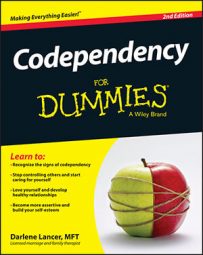Normally, shame passes after an embarrassing incident, but for codependents shame is internalized from experiences in childhood. It sits there waiting to be activated and persists long after the event, like an open wound that has never healed. You’re ashamed of who you are. It’s all pervasive, paralyzes spontaneity, and defines you.
You don’t believe that you matter or are worthy of love, respect, success, or happiness. You think that you’re bad, defective, inadequate, a phony, a failure, or worse.
Chronic internalized shame makes ordinary shame feel more intense and last longer, and it creates shame anxiety largely about being acceptable to yourself and other people. Extreme, prolonged shame can lead to hopelessness and despair or cause psychic numbing, being dead inside like a zombie.
Internalized shame causes low self‐esteem and most codependent symptoms, such as pleasing, addiction, control, caretaking, depression, lack of assertiveness, intimacy problems, and perfectionism. Core feelings that stem from low self‐esteem and internalized shame are listed in the following table.
| Low Self-Esteem | Shame | Fear | Guilt |
|---|---|---|---|
| You Lack: | You Feel: | You Fear: | You Feel Guilt About: |
| Self-confidence | Unworthiness | Abandonment | Your feelings |
| Self-trust | Unlovable | Rejection | Your actions |
| Self-acceptance | Anxiety | Making mistakes | Your needs |
| Self-responsibility | Unimportant | Criticism | Others’ feelings |
| Self-efficacy (agency) | Undeserving | Failure and success | Others’ actions |
| Self-respect | Self-loathing | Intimacy | Others’ needs |
| Self-value/worth | Judgmental | Own power | Others’ problems |
Internalized shame creates a chronic sense of inferiority. You may envy and compare yourself negatively to people whom you admire. You may believe you’re never enough, that you’re not doing enough, attractive enough, smart enough, or good enough. Because shame is painful, you may be unconscious of your shame and think you have good self‐esteem.
You may boast or feel self‐important and superior to those you teach or supervise, people of a different class or culture, or anyone you judge. By devaluing others, you boost yourself higher to deny and hide your shame from yourself. Most codependents fluctuate between feeling inferior and superior.

